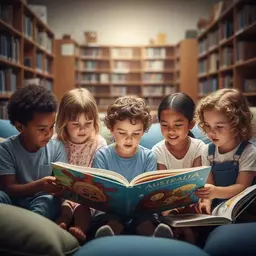Creative Storytelling Ideas for Kids

Are you aware of the immense impact storytelling can have on a child's development? This powerful tool is not just about entertainment; it cultivates creativity, language skills, and emotional intelligence, paving the way for a richer understanding of the world.
What You Will Learn
- Storytelling enhances children's vocabulary by introducing them to new words and phrases.
- It fosters emotional intelligence as children learn to navigate their feelings through character experiences.
- Creative storytelling boosts imagination, helping kids develop unique ideas and perspectives.
- Engagement in storytelling activities improves social skills and promotes collaboration among peers.
- Story mapping and character development techniques reinforce narrative skills and creativity.
- Tracking a child's imaginative development encourages self-reflection and recognizes their creative milestones.
- Incorporating expert insights highlights the critical role of storytelling in emotional and cognitive growth.
- Discussing common themes in children's literature deepens their understanding and connection to personal experiences.
The Power of Storytelling for Kids: Key Benefits and Techniques
Storytelling is a crucial tool for nurturing young minds, enhancing creativity, language skills, and emotional expression. This visual highlights its core benefits and effective techniques.
Key Benefits of Storytelling
- ✓ Enhances Vocabulary
- ✓ Encourages Emotional Intelligence
- ✓ Boosts Imagination
- ✓ Develops Critical Thinking
Effective Storytelling Techniques
- ► Interactive Storytelling
- ► Story Mapping (Visual Aids)
- ► Character Development
- ► Use of Props
Expert Insights
"Storytelling is an essential tool in developing emotional intelligence and creativity in children."
"Children who engage in storytelling and role-playing are better equipped to handle real-life situations."
Common Themes in Children's Stories
- ★ Friendship
- ★ Adventure
- ★ Overcoming Challenges
- ★ Identity & Belonging
Igniting Imagination: The Power of Storytelling for Kids
At Kids Book Guide, we believe that the art of storytelling is one of the most powerful tools for nurturing young minds. Through imaginative tales, children not only embark on adventures but also enhance their creativity, language skills, and emotional expression. Storytelling opens the door to a world where anything is possible—all it takes is a little imagination!
When we dive into a story, we ignite our curiosity and spark the flames of creativity. Stories help kids make sense of their world, allowing them to explore complex emotions and ideas. By hearing different narratives, they learn to empathize with others, understand diverse perspectives, and articulate their feelings more clearly. Isn't that amazing?
Understanding the Importance of Creative Storytelling
Creative storytelling isn't just fun—it's crucial for a child's development. Let's explore some of the key benefits:
- Enhances Vocabulary: Exposure to new words and phrases through storytelling enriches children's language skills. Research highlights that storytelling significantly contributes to children's language development and vocabulary acquisition.
- Encourages Emotional Intelligence: By relating to characters, children learn to navigate their own feelings.
- Boosts Imagination: Stories transport children to different worlds, fostering creativity and originality in their thinking.
- Develops Critical Thinking: Plot twists and character decisions challenge kids to think critically about choices and consequences.
As an educator, I've seen firsthand how passionate storytelling can light up a child's face, making them eager to read and share their own tales. This joy creates a ripple effect, inspiring them to pursue their own storytelling adventures!
How Storytelling Activities Can Be Beneficial
Engaging in storytelling activities encourages children to stretch their imaginations and develop important skills. Here are some benefits tied to imaginative play:
- Social Skills: Group storytelling encourages collaboration and social interaction.
- Cognitive Development: It promotes problem-solving as children navigate plotlines and character arcs.
- Confidence Building: Sharing stories helps children build self-esteem through expression.
- Listening Skills: Participating in storytelling hones their ability to listen attentively and respond appropriately.
By fostering creativity through these activities, we can help children thrive both academically and socially, setting the foundation for lifelong learning!
Exploring Storytelling Techniques for Kids
There are numerous storytelling techniques that captivate children's imaginations and reinforce their narrative skills. Here are a few delightful methods:
- Interactive Storytelling: Engage children by allowing them to contribute to the story, making it a collaborative experience.
- Story Mapping: Visual aids like story maps help children outline their tales, reinforcing structure and organization.
- Character Development: Encourage kids to create unique characters with distinct traits, enhancing their narrative depth.
- Use of Props: Incorporating simple props can make storytelling more dynamic and immersive.
As we experiment with these techniques, we create an environment where storytelling flourishes, allowing children's creativity to flow freely. After all, every young reader is a potential storyteller waiting to be discovered!
Engaging Storytelling Ideas Tailored for Young Minds
Now that we've explored the importance of storytelling, let's dive into some engaging activities that can inspire creativity and imagination!
Pro Tip
Did you know? Incorporating storytelling into everyday activities can significantly boost a child's creativity. For instance, make up a story while driving, or create a tale using items from around the house. This not only makes mundane tasks fun but also nurtures their imaginative skills!
Reflecting on the Journey: Supporting Imagination Growth
Tracking Imagination Development Over Time
As parents and educators, we play a pivotal role in nurturing a child's creativity. To effectively track this imagination development, it's essential to create a framework that allows us to observe their growth. Here are some practical ways to monitor children's creative journey:
- Keep a creativity journal to document their stories, drawings, and play.
- Regularly engage in discussions about their imaginative play and storytelling.
- Set goals for creative projects and celebrate their achievements.
- Encourage self-reflection by asking children how they feel about their creations.
By using these strategies, we can not only track their progress but also inspire them to keep exploring their creative depths. Remember, every child's journey is unique, and it’s essential to celebrate their individual milestones!
Expert Insights on Storytelling and Child Development
Incorporating insights from child development experts can provide us with valuable perspectives on storytelling's impact. For instance, renowned child psychologist Dr. Laura Markham states, “Storytelling is an essential tool in developing emotional intelligence and creativity in children.” This reinforces the idea that as we encourage storytelling, we are also fostering vital skills that aid in their overall growth. Studies also emphasize the importance of storytelling in children's cognitive and emotional development.
Additionally, educational consultant Dr. David Elkind emphasizes the importance of imaginative play, suggesting that “children who engage in storytelling and role-playing are better equipped to handle real-life situations.” These expert opinions, including insights on how storytelling influences social-emotional development, confirm the importance of nurturing creativity through storytelling!
Exploring Themes in Children's Stories
Children's literature is rich with themes that can inspire creativity and spark imagination. Some common themes include:
- Friendship: Stories often explore the bonds between characters, teaching empathy and cooperation.
- Adventure: Tales of exploration encourage children to think beyond their surroundings.
- Overcoming challenges: Stories that depict resilience help children understand that they can conquer their fears.
- Identity and belonging: Themes of self-discovery can inspire children to express their thoughts and feelings.
By discussing these themes in stories, we can help children connect their personal experiences to the narratives, enriching their understanding and fostering their imagination even further. These stories are not just entertaining; they are important stepping stones in a child's creative development!
Frequently Asked Questions About Storytelling for Kids
Q1: Why is storytelling important for a child's development?
A1: Storytelling is crucial because it enhances vocabulary, encourages emotional intelligence, boosts imagination, and develops critical thinking skills. It helps children understand the world and their place in it.
Q2: How does storytelling enhance a child's vocabulary?
A2: Through storytelling, children are exposed to new words and phrases in context, which helps them learn and retain new vocabulary more effectively than rote memorization.
Q3: What role does storytelling play in developing emotional intelligence?
A3: By relating to characters and their experiences in stories, children learn to identify, understand, and navigate their own feelings, fostering empathy and emotional resilience.
Q4: Can storytelling improve social skills?
A4: Yes, engaging in group storytelling activities encourages collaboration, active listening, and expression, all of which are vital for developing strong social skills.
Q5: What are some effective storytelling techniques for kids?
A5: Effective techniques include interactive storytelling where children contribute, using story mapping for structure, encouraging character development, and incorporating props to make stories more engaging.
Q6: How can parents and educators track a child's imagination development?
A6: Parents and educators can track development by keeping a creativity journal, engaging in discussions about imaginative play, setting creative project goals, and encouraging self-reflection about their creations.
Recap of Key Points
Here is a quick recap of the important points discussed in the article:
- Enhances Vocabulary: Exposure to storytelling enriches children's language skills.
- Encourages Emotional Intelligence: Relating to characters helps children navigate their own feelings.
- Boosts Imagination: Stories transport children to different worlds, fostering creativity.
- Develops Critical Thinking: Plot twists and character decisions challenge kids' analytical skills.
- Fosters Social Skills: Group storytelling encourages collaboration and interaction.
- Cognitive Development: It promotes problem-solving as children navigate storylines.
- Confidence Building: Sharing stories helps children express themselves and build self-esteem.
Popular Posts
 As you navigate the vibrant world of children's literature, think about how a simple signature can t
As you navigate the vibrant world of children's literature, think about how a simple signature can t
 What if the right book could unlock your child's imagination and build their future? Understanding a
What if the right book could unlock your child's imagination and build their future? Understanding a
 Reading stories isn't just a pastime; it's a powerful catalyst for children's education. Australian
Reading stories isn't just a pastime; it's a powerful catalyst for children's education. Australian
 In the words of Aveline Carter, "The journey of discovering books can be just as exciting as reading
In the words of Aveline Carter, "The journey of discovering books can be just as exciting as reading
